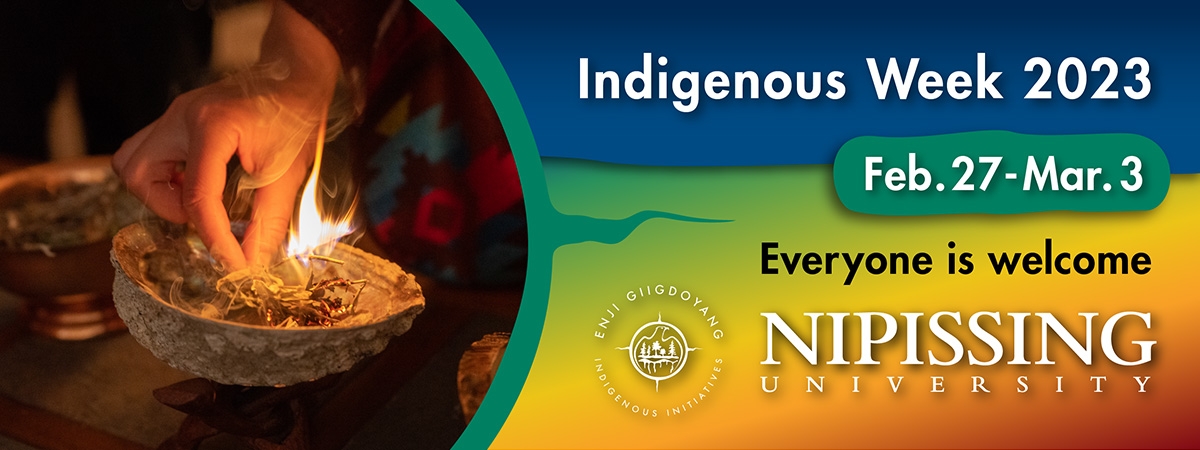
February 27 - March 3, 2023
Enji giigdoyang, the Office of Indigenous Initiatives, welcomes students, staff, faculty and community to engage in a series of talks, workshops, and film screenings by Indigenous knowledge holders, professionals, writers, scholars, artists, and filmmakers. Please join us for one or many sessions throughout the week. Registration is required.
Speakers Biographies
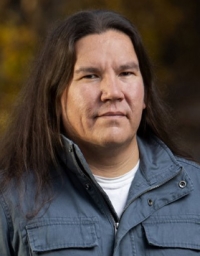
Waubgeshig Rice
Keynote Speaker
Waubgeshig Rice is an author and journalist from Wasauksing First Nation. He has written three fiction titles, and his short stories and essays have been published in numerous anthologies. His most recent novel, Moon of the Crusted Snow, was published in 2018 and became a national bestseller. He graduated from the journalism program at Toronto Metropolitan University in 2002 and spent most of his journalism career with the Canadian Broadcasting Corporation as a video journalist and radio host. He left CBC in 2020 to focus on his literary career. He lives in Sudbury, Ontario with his wife and children His forthcoming novel, Moon of the Turning Leaves, will be published in October 2023.
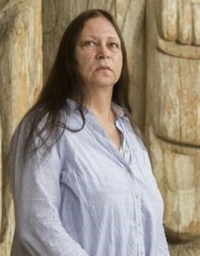
Dr. Paulette Steeves
Keynote Speaker
Dr. Paulette Steeves. Ph.D. (Cree-Metis) is an Indigenous archaeologist with a focus on the Pleistocene history of the Western Hemisphere. In her research, Steeves argues that Indigenous peoples were present in the Western Hemisphere as early as 100,000 years ago, and possibly much earlier. She has created a database of hundreds of archaeology sites in both North and South America that date from 250,000 to 12,000 years before present, which challenges the Clovis First dogma of a post 12,000 year before present initial migrations to the Americas.
She received her BA Honors Cum Laude in 2000 at the University of Arkansas at Fayetteville. In 2008 Dr. Steeves was awarded the Clifford D. Clark fellowship to attend graduate studies at Binghamton University in New York State and was awarded her Masters in Anthropology 2010, and Doctorate in Anthropology in 2015. During her doctoral studies, she worked with the Denver Museum of Nature and Science to carry out studies in the Great Plains on mammoth sites which contained evidence of human technology on the mammoth bone, thus showing that humans were present in Nebraska over 18,000 years ago. Dr. Steeves has taught Anthropology courses with a focus on Native American and First Nations histories and studies, and decolonization of academia and knowledge production at Binghamton University, Selkirk College Fort Peck Community College, the University of Massachusetts at Amherst, and Mount Allison University, she is currently an Associate professor in Sociology and Anthropology.
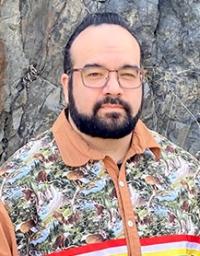
Bryan Bellefeuille
Bryan Bellefeuille (Wabi Muskwa, Waabizheshi dodem) is a firekeeper, a traditional dancer, a Lake Nipissing fisherman, a loving husband and father of three. Bryan graduated from the Schulich School of Education after completing an undergraduate degree in Mathematics at Nipissing University. In 2022, Bryan was appointed as an adjunct professor with Nipissing University as part of the Faculty of Arts & Science. He began his career working with Indigenous people as a Gladue Report Writer within the Ontario and Canadian Criminal Justice System. When he began focusing his career in education, he was an editor on the Ontario curriculum writing team for Grade 10 History, in response to the Truth and Reconciliation Commission’s Call to Actions. Currently, he works full time at WC Eaket Secondary School in Blind River as an Anishinaabemowin language, Indigenous STEM teacher and Instructional Support Teacher. Bryan is committed to research in Anishinaabe mathematics and implementation of teaching principles of Indigenous STEM in the classroom. He focuses his efforts in multiple facets to ensure the success of the Anishinaabe STEM and prioritizes classroom teaching, curriculum development and training.
In 2022, partnering with the Lassonde School of Engineering k2i academy, he co-developed and delivered an inaugural Indigenous Engineering, Technology, & Innovation by Design program. This work-integrated program engaged students to pursue their curiosity and interests by working on engineering projects that apply Indigenous knowledge and traditional Indigenous Engineering processes to design solutions to challenges in their community. He has provided a number of public engagements and presentations within the Indigenous education sector, including:
- Traditional Indigenous Mathematics live classroom presentation hosted by the Ontario Science Centre
- Indigenous Ways of Knowing in Math and Science at the Robertson Program: for Inquiry-Based Teaching in Mathematics and Science with the University of Toronto, OISE
- Teach for Canada, Summer Enrichment Program facilitator
- Indigenous Mathematics - Carleton University single session
- Series of Indigenous Math workshops with educators from the Toronto Catholic District School Board
- Speaker on the Importance of Indigenous knowledge at a Sudbury Catholic District School Board PD Day
- Panelist on the Symposium on the Importance of Indigenous Education in Ontario Classrooms at the University of Toronto Mississauga
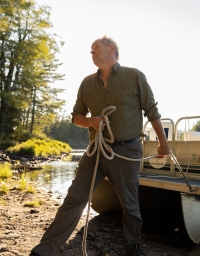
Norm Dokis
Norm Dokis is a professional nature interpreter who uses the Indigenous ways of knowing in his land based teachings. Norm grew up on the land as a guide for tourists who visited his community of Dokis. With a lifetime of experience, Norm employs a balanced approach of story-telling, humour, bushcraft skills, history, and a variety of topics in order to provide an wholistic educational experience.
Schedule of Events
Indigenous Week 2023
Monday, February 27, 2023 - Friday, March 3, 2023
Hosted annually by the Office of Indigenous Initiatives this week-long event centres Indigenous voices, histories and knowledge and welcomes students, staff, faculty and community members to engage in a week of workshops, talks, film screenings and land-based activities led by Indigenous knowledge holders, Elders, scholars, artists and film makers.
Indigenous Week Opening
Monday, February 27, 2023 , 01:00 PM
Join us to open Indigenous Week 2023
Indigenous Mobilization – Scavenger Hunt and Campfire
Monday, February 27, 2023 , 10:00 AM - 04:00 PM
Students of INDG 4606 would like to invite you to take part in a scavenger hunt and campfire on the Nipissing University trails.
Anishnaabe Ways of Life and Mathematical Applications
Tuesday, February 28, 2023 , 04:00 PM
Join us for a description of how this new course will provide an opportunity for students to deepen their understanding of mathematical concepts and their application from an Indigenous perspective. Understand how the course intends to empower students with the confidence to learn Anishinabek ways of teaching, knowing, and learning, and to help them articulate these concepts through class discussion, written, oral, and creative activities.
Indigenous Week Keynote Presentation: Waub Rice
Wednesday, March 1, 2023 , 01:00 PM
Join us for a conversation with Waub Rice.
Wilderness Walk Onaabdin-giizis (Snowcrust Moon) with Norm Dokis
Thursday, March 2, 2023 , 01:00 PM
Join local knowledge holder Norm Dokis for a winter walk on Nipissing University trails.
Geraldine Govender - Round Dance Teaching
Thursday, March 2, 2023 , 06:00 PM
Geraldine Govender joins us from Moose Factory to speak about traditional protocol surrounding Round Dance ceremony and its significance. She will discuss the roles of women in the round dance ceremony, the preparation of the feast, and touch on moon time, among other topics.
Indigenous Week Keynote Presentation: Dr. Paulette Steeves
Friday, March 3, 2023 , 10:30 AM
Un-erasing The Indigenous Paleolithic of Western Hemisphere (the Americas)
Minweyaang Round Dance
Saturday, March 4, 2023 , 03:00 PM - 11:00 PM
Pipe and Feast Ceremony 3:00 - 5:00 pm, Round Dance 6:00 pm
